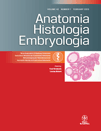
ANATOMIA HISTOLOGIA EMBRYOLOGIA
Scope & Guideline
Exploring the Intricacies of Life's Foundations
Introduction
Aims and Scopes
- Comparative Anatomy and Morphometry:
The journal emphasizes comparative studies of anatomical structures across different species, utilizing morphometric techniques to analyze variations and adaptations. This includes detailed examinations of skeletal systems, organ structures, and specific anatomical features that highlight evolutionary relationships. - Histological and Ultrastructural Analysis:
A core focus is on histological and ultrastructural investigations, employing advanced microscopy techniques to explore the cellular and tissue-level organization in various organisms. This approach facilitates insights into normal and pathological conditions. - Embryological Development:
The journal covers embryological studies that investigate developmental processes across species, including the impact of environmental factors and genetic influences on growth and differentiation. - Innovative Methodologies:
There is a strong emphasis on the application of innovative methodologies, such as advanced imaging techniques (e.g., MRI, CT scans) and stereological approaches, to enhance the accuracy and depth of anatomical and histological research. - Veterinary and Clinical Relevance:
Many studies aim to bridge the gap between basic anatomical research and clinical applications, contributing to veterinary medicine and animal husbandry by providing insights that can inform surgical practices and treatment protocols.
Trending and Emerging
- Integration of Digital Technologies:
There is a noticeable increase in studies utilizing digital technologies, such as virtual microscopy and computational modeling, to enhance educational practices and research methodologies in anatomy and histology. - Molecular and Immunohistochemical Studies:
Emerging themes include the application of molecular techniques and immunohistochemistry to explore cellular processes and disease mechanisms, reflecting a trend towards understanding anatomy at the molecular level. - Environmental and Ecological Adaptations:
Research focusing on how anatomical structures adapt to environmental changes and ecological niches is gaining traction, particularly in the context of climate change and habitat alterations. - Veterinary Applications and Animal Welfare:
A growing number of studies are focusing on veterinary applications, emphasizing anatomical and histological insights that can improve animal welfare and inform clinical practices. - Comparative Physiology and Function:
There is an emerging trend towards understanding the physiological implications of anatomical structures, with studies linking morphology to functional outcomes in various species.
Declining or Waning
- Traditional Histological Techniques:
There appears to be a decline in papers focused solely on traditional histological techniques, as the field increasingly embraces advanced imaging and molecular techniques for deeper insights into tissue structure and function. - Generalized Anatomical Studies:
Broad anatomical surveys without specific hypotheses or comparative analyses are becoming less common, as the journal shifts towards more targeted studies that address specific research questions or clinical implications. - Single-Species Focus Studies:
Research focused on a single species, without comparative analysis, has decreased. There is a growing trend towards studies that place a species within a broader comparative framework, enhancing the understanding of evolutionary relationships.
Similar Journals
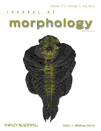
JOURNAL OF MORPHOLOGY
Fostering Communication in Anatomical ResearchEstablished in 1887, the Journal of Morphology is a pioneering publication in the field of morphology, specializing in the anatomical and developmental biology of diverse organisms. Published by Wiley, this journal features high-quality research that spans multiple disciplines, including animal science and zoology, with a current ranking of Q2 in these areas. Although it lacks an open-access option, the journal is committed to advancing knowledge and facilitating scientific communication among professionals in developmental biology, as indicated by its ongoing contributions since its convergence years and up to 2024. With an impact factor that reflects its importance in the scientific community, the Journal of Morphology is a vital resource for researchers, professionals, and students seeking to understand complex morphological processes and their implications in modern science. Its dedication to publishing rigorous, peer-reviewed articles makes it an indispensable asset in the exploration of life's intricacies.

MICROSCOPY RESEARCH AND TECHNIQUE
Elevating microscopy standards for the scientific community.Microscopy Research and Technique, published by Wiley, is a leading journal in the field of microscopy, emphasizing innovative research and advancements in both techniques and applications. With an ISSN of 1059-910X, this journal caters to a diverse audience, including researchers, professionals, and students, and spans various disciplines such as anatomy, histology, and medical laboratory technology. As evidenced by its impressive 2023 ranking in Scopus, placed in the top quartile for Anatomy and Medical Laboratory Technology, the journal continues to play a pivotal role in enhancing the understanding of microscopic techniques and their applications in life sciences. While it does not currently offer open access, the journal’s content is invaluable for those in the research community seeking to remain at the forefront of microscopy advancements. Covering a broad range of topics from basic research to clinical applications, Microscopy Research and Technique is a vital resource for anyone involved in scientific discovery through microscopy.

Anatomical Sciences Education
Advancing Knowledge in Anatomy and BeyondAnatomical Sciences Education is a premier academic journal published by WILEY, dedicated to promoting and disseminating research in the fields of anatomy, embryology, and histology. With an impressive impact factor reflecting its Q1 ranking in key categories such as Anatomy, Embryology, and Histology, this journal serves as a vital resource for researchers, professionals, and students alike. Since its inception in 2008, Anatomical Sciences Education has cultivated a robust platform for advanced scholarship, offering insights that enhance educational practices and methodologies in anatomical sciences. Based in the United States, the journal aims to foster innovation and collaboration within the scientific community, positioning itself as a cornerstone in the pursuit of knowledge in medicine at large. As the journal continues to thrive, it remains committed to open dialogue and sharing groundbreaking discoveries that shape the future of anatomical education and research.
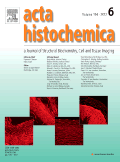
ACTA HISTOCHEMICA
Fostering Global Dialogue in Histochemistry and Cell BiologyACTA HISTOCHEMICA, a prestigious journal published by Elsevier GmbH, is dedicated to advancing the field of histochemistry and its applications within cell biology and medicine. With an ISSN of 0065-1281 and an E-ISSN of 1618-0372, the journal provides a critical platform for the dissemination of high-quality research findings and reviews, integral for both emerging and established scholars. Since its inception in 1954 and continuing through to 2024, ACTA HISTOCHEMICA has maintained a strong commitment to publishing significant advancements in histology and cell biology, as evidenced by its categorization in Q3 for Cell Biology and Histology, as well as Q2 in miscellaneous medicine for the year 2023. The journal ranks favorably in Scopus, holding the 27th rank in Histology and a 200th rank in Cell Biology, highlighting its importance to the academic community. With its headquarters in Munich, Germany, ACTA HISTOCHEMICA continues to attract contributions from global researchers, fostering an international dialogue essential for the growth of knowledge in histochemistry and related disciplines.
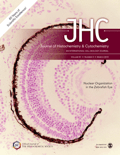
JOURNAL OF HISTOCHEMISTRY & CYTOCHEMISTRY
Connecting Researchers with Cutting-Edge DiscoveriesWelcome to the JOURNAL OF HISTOCHEMISTRY & CYTOCHEMISTRY, a premier platform for the dissemination of cutting-edge research in the fields of anatomy and histology. Published by SAGE PUBLICATIONS LTD, this esteemed journal has been a cornerstone of academic inquiry since its inception in 1953 and continues to play a vital role in advancing our understanding of cellular structure and function. With an impressive Impact Factor reflected in its rank as Q1 in both Anatomy and Histology categories, the journal ranks #5 out of 48 in Medicine Anatomy and #17 out of 62 in Medicine Histology, making it an essential resource for researchers and professionals alike. The journal provides a rigorous peer-review process and encourages submissions that enhance the scientific community's knowledge. As a vital resource for students, professionals, and researchers focusing on histochemical methodologies, the JOURNAL OF HISTOCHEMISTRY & CYTOCHEMISTRY offers insights into the latest advancements and critical debates within this dynamic discipline.

PERIODICUM BIOLOGORUM
Empowering Researchers Through Quality ScholarshipPERIODICUM BIOLOGORUM is a well-established interdisciplinary journal published in Croatia that focuses on advancing the fields of agricultural and biological sciences, biochemistry, genetics, and molecular biology, along with general medicine. With its roots dating back to 1980, the journal has been an essential platform for the dissemination of original research, reviews, and theoretical studies, fostering collaboration and dialogue among researchers within these diverse areas. While currently holding a Q4 quartile ranking in several categories, including agricultural and biological sciences, biochemistry, and general medicine, it provides a significant opportunity for authors seeking to contribute to the body of knowledge in these sectors. Although Open Access options are not available, the journal's rich history and commitment to quality scholarship make it a valuable resource for professionals, researchers, and students alike, aiming to stay informed about current trends and advancements in biological research and its applications.

HISTOCHEMISTRY AND CELL BIOLOGY
Advancing the Frontiers of Cellular ScienceHISTOCHEMISTRY AND CELL BIOLOGY, published by SPRINGER, is a prominent journal dedicated to advancing the fields of histochemistry and cell biology. With an ISSN of 0948-6143 and an E-ISSN of 1432-119X, this journal has carved a significant niche since its inception in 1995, striving for excellence in research dissemination through a rigorous peer-review process. The journal's impact is reflected in its strong performance across various academic categories, achieving a Q1 ranking in Medical Laboratory Technology, Q2 in Histology, and maintaining a credible presence in Cell and Molecular Biology. Nestled in Germany, and with the backing of a reputable publisher, HISTOCHEMISTRY AND CELL BIOLOGY serves as a pivotal platform for researchers, professionals, and students, fostering innovations that push the boundaries of our understanding of cellular processes. While the journal is not open access, it offers subscription-based access options ensuring comprehensive coverage of crucial findings in the rapidly evolving arena of cell biology and histochemistry.
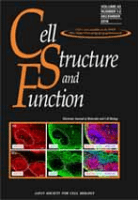
CELL STRUCTURE AND FUNCTION
Connecting Researchers to Cellular DiscoveriesCELL STRUCTURE AND FUNCTION is a distinguished open-access journal published by the Japan Society for Cell Biology, dedicated to advancing the field of cell biology and related disciplines. Since its inception in 1975, and now with open access available since 2017, the journal seeks to disseminate cutting-edge research and reviews that delve into the complexities of cellular structures and their functions. With a notable presence in various categories—ranked Q3 in Cell Biology and Molecular Biology and Q2 in Medicine (Miscellaneous) and Physiology as of 2023—this journal caters to a global audience of researchers, professionals, and students who are keen to explore the latest findings in cellular research. The efforts to foster accessibility and promote scholarly exchange in the field make CELL STRUCTURE AND FUNCTION an essential resource for those looking to stay at the forefront of biological sciences. The journal is indexed in Scopus, marking its relevance and reliability in the academic community. Explore the vast potential of cell biology through this comprehensive platform.
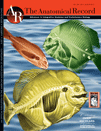
Anatomical Record-Advances in Integrative Anatomy and Evolutionary Biology
Connecting the Dots Between Anatomy and Evolution.Anatomical Record-Advances in Integrative Anatomy and Evolutionary Biology, an esteemed journal published by WILEY, serves as a pivotal platform for scholars in the fields of anatomy, biotechnology, ecology, evolutionary biology, and histology. With an ISSN of 1932-8486 and an E-ISSN of 1932-8494, this journal has demonstrated its academic rigor by maintaining a Q2 ranking across multiple relevant categories, including Anatomy and Biotechnology, and consistently achieving a high Scopus ranking in its respective fields. Its scope, covering integrative approaches to anatomical research and evolutionary studies, fosters interdisciplinary collaboration and innovation. Researchers and practitioners can access the journal through various open-access options, ensuring that groundbreaking findings are disseminated widely. As a vital resource for advancing knowledge and exploring emerging trends, this journal greatly contributes to the understanding of biological systems and evolutionary processes, making it an essential read for those dedicated to pushing the boundaries of their respective disciplines.
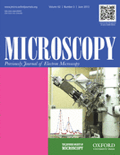
Microscopy
Illuminating the Future of Imaging and AnalysisMicroscopy, published by Oxford University Press, is a prestigious journal dedicated to advancing the field of microscopy and imaging in biological and applied sciences. With a dynamic coverage dating from 1953 to the present, it offers vital insights into the latest techniques and applications across various disciplines, including Instrumentation, Radiology, Nuclear Medicine and Imaging, and Structural Biology. The journal is recognized for its quality, illustrated by its Q2 and Q3 quartile rankings in relevant categories for 2023. Researchers, professionals, and students will find Microscopy an invaluable resource for keeping abreast of contemporary developments and methodologies in the field. As an open-access journal, it promotes equitable access to cutting-edge research and fosters collaboration among the international scientific community, making it essential reading for anyone involved in microscopy research and its applications. For more information, please visit their site for access options and contributions.